Buying A Used Car From A Car Dealership
by Marsh Finance on Sep 3, 2024 2:31:31 PM
.png?width=800&height=300&name=Dealership%20Vs%20Private%20Seller%20(1).png)
Buying a used car from a dealership offers more protection and support than private sales, but usually at a higher price.
Buying A Used Car: Dealerships Vs. Private Sellers
Summary: Dealerships usually cost more than private sellers, but the extra price pays for legal protection, warranties, and peace of mind.
Let's break down the pros and cons of buying from a dealer, independent garage, or driveway trader.
Dealerships
- Pros: Rigorous inspections, warranties, and after-sales support.
- Cons: Higher upfront costs due to overhead expenses.
Independent Garages
- Pros: Often more affordable than dealerships, with a focus on customer satisfaction.
- Cons: It may not offer the same level of inspection or warranty as a dealer.
Driveway Traders
- Pros: Potentially the cheapest option, as they often have lower overhead costs.
- Cons: May offer less preparation and after-sales support.
Things To Consider
- Warranty: Dealerships typically offer warranties, providing peace of mind in case of issues.
- Inspection: Dealerships often conduct thorough inspections before selling cars.
- Consumer Rights: All traders must comply with the Consumer Rights Act, protecting your rights if the car is faulty.
- Time Limit: You generally have 30 days to reject a faulty vehicle and claim a refund.
- Roadworthiness: Sellers cannot sell a vehicle that's not roadworthy under the Road Traffic Act 1988.
Remember: While buying from a driveway trader might seem cheaper upfront, potential repair costs could outweigh the savings. Consider all factors before making a decision.

Your Rights When Buying A Used Car
Summary: Cars bought from dealers must be of satisfactory quality, fit for purpose, and as described, with strong rights in the first 30 days.
Under the Consumer Rights Act, all cars bought from dealers must be:
- Satisfactory quality: The car should be in good condition and fit for its purpose.
- Fit for purpose: The car should be suitable for the use you intend it for.
- As described: The car should match the description given by the seller.
Roadworthiness: The car must be safe to drive. Selling a vehicle that's not roadworthy is illegal under the Road Traffic Act 1988.
If you find a fault with the car, you may be entitled to:
- Repair: The seller must repair the fault within a reasonable time.
- Replacement: The seller may replace the car with a similar one.
- Refund: If repairs or replacement don't fix the problem, you may be entitled to a refund.
The time you have to claim depends on when you discovered the fault:
- Within 30 days: You can reject the car and get a full refund.
- Between 31 and six months: You can get a repair or replacement. If this doesn't fix the problem, you can reject the car and get a refund (minus a deduction for your use of the car).
- After six months: You must prove that the fault existed when you bought the car. If you can prove this, you can get a repair or replacement.
After six years: You have no legal rights under the Consumer Rights Act.
If you paid for the car with a credit card, you may be able to get the money back from your credit card provider. Under the Consumer Credit Act 1974, they may be jointly responsible for problems with the vehicle.
Remember: It's important to act quickly if you find a fault with your car. The longer you wait, the harder it may be to prove that the fault existed when you bought the car.
.webp?width=800&height=300&name=Ticks%20Checklist%20(1).webp)
Preparation Is Key: Before You Hit The Showroom
Summary: Preparing your budget, researching models, and shopping around helps you avoid pressure and make a confident decision.
-
- Do Your Research: Knowledge is power! Before you set foot on a dealership lot, research the different car models you're interested in. Read reviews, check out reliability ratings, and get a sense of fair market value. Trust us; knowing your stuff helps you to negotiate with confidence.
- Set Your Budget: Don't get swept away in the excitement! Determine how much you can comfortably afford for the car, insurance, tax, and maintenance. Marsh Finance offers a variety of car finance options to help fit your budget, so explore those, too!
- Shop Around (Online and IRL): Don't limit yourself to one dealership. Check online car sale websites like Autotrader or browse the lots of different dealerships. This gives you a broader picture of pricing and options.
.png?width=800&height=300&name=Car%20Checks%20(1).png)
How To Tell If A Used Car Dealership Is Reputable
Summary: Reputable dealerships are transparent, well-reviewed, and happy to prove a car’s history, condition, and legal compliance.
- A high number of positive reviews.
- Been trading for a significant amount of time.
- Members of industry-relevant trade bodies.
- Have they shown a past willingness to be independently inspected.
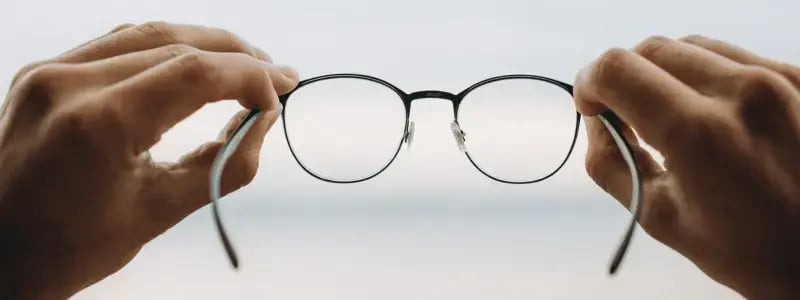
What To Check Before Buying A Used Car
Summary: A thorough inspection helps you spot hidden problems, avoid unexpected repair costs, and negotiate a fair price.
Checking Your Tires
When inspecting a used car, don't forget to check the tyres. Here's what to look for:
- Tread depth: Tyres need at least 1.6mm of tread. If they're below 3mm, you'll need to replace them soon.
- Tire condition: Check for any damage, like cuts or bulges.
- Tyre type: If you're buying a performance car, you'll want matching premium tyres.
Remember: Budget brand tyres might be okay for a cheap car, but you'll want better tyres for a more expensive car.
To check your tyre tread: Use a 20p coin. If you can see the coin's outer edge when you put it in the grove, you need new tyres.
Inspecting The Bodywork
- Look for dents and scratches: Check the car's body for any damage.
- Check the wheels: Look for signs of kerbing.
- Inspect in a good light: Rain or darkness can hide the damage.
- Don't be afraid to negotiate: Small dents or scratches can be fixed cheaply, so use them to your advantage.
Checking Panel Gaps
When inspecting the car's body, look at the gaps between the panels. If they're uneven or large, it could be a sign that the vehicle was badly repaired after an accident. Also, make sure the panels are all the same colour.
Checking Fluid Levels
- Open the bonnet and check the fluids: Check the oil, brake fluid, and power steering fluid levels.
- Look for leaks: If the levels are low, check for leaks under the bonnet and where the car is usually parked.
Remember: Low fluid levels can be a sign that the car hasn't been looked after well.
Checking The Oil Cap
- Check the oil level: Make sure the oil level is good.
- Look under the oil cap: Check for a white, mayonnaise-like substance. This could be a sign of a failed head gasket.
- Check the coolant expansion tank: Make sure it's clean.
Checking The Electrics
- Test everything: Wind the windows up and down, turn the radio off, and test the air conditioning.
- Look for faults: It could be a negotiating point if something doesn't work.
Checking The Glass
- Inspect the windscreen: Check for any chips or cracks. Chips can turn into cracks, which might fail an MOT.
- Check the front and rear lights: Look for chips, cracks, fogging, or moisture.
Checking The Interior
- Inspect the seats: Look for any stains or tears.
- Check for smells: The car shouldn't smell bad. Bad smells can be very off-putting and hard to get rid of, especially if a car has been smoked in.
Checking For Extras
- Spare wheel: Does the car come with a spare wheel?
- Jack: If you get a flat tyre, is there a jack to lift the car?
- Locking wheel nut adapter: Do you need an adapter for the locking wheel nuts?
Checking For Wear And Tear
All used cars will have some wear and tear, but it should be consistent with the car's age and mileage. For example, a car with low mileage but a lot of wear on the driver's seat, steering wheel, and pedals might be a red flag.
If you're unsure what to look for, it's a good idea to bring someone who knows about cars. A vehicle inspection can also be helpful. A trained mechanic can check the car for any problems that might need repairs later.
%20(1)%20(1).webp?width=800&height=300&name=Car%20Crash%20(1)%20(1)%20(1).webp)
Checking For Accident Damage
When inspecting a used car, pay close attention to the bodywork. Here's what to look for:
- Panel gaps: Make sure the gaps between panels are even and small.
- Paint colour: Check for any colour differences between panels.
- Ripples in the bodywork: This could be a sign of poor repairs after an accident. Use a magnet to check for filler, which isn't magnetic.
- Car specifications: Know the car's features and options. If it's missing something it should have, ask why.
- Number plates: Check to make sure the supplier's name is printed on the number plates. If they don't, ask why.
Remember: If you find any signs of damage, ask the car dealership for an explanation and negotiate the price.
.png?width=800&height=300&name=Documents%20Contract%20Signing%20(1).png)
Checking The Documents
The most important document to check when buying a used car is the V5C, also known as the logbook.
Make sure the following information matches:
- Make and model: The car's make and model should match the information on the V5C.
- Number plate: The number plate on the car should match the number plate on the V5C.
- VIN: The Vehicle Identification Number (VIN) on the car should match the VIN on the V5C. You can find the VIN outside the windscreen.
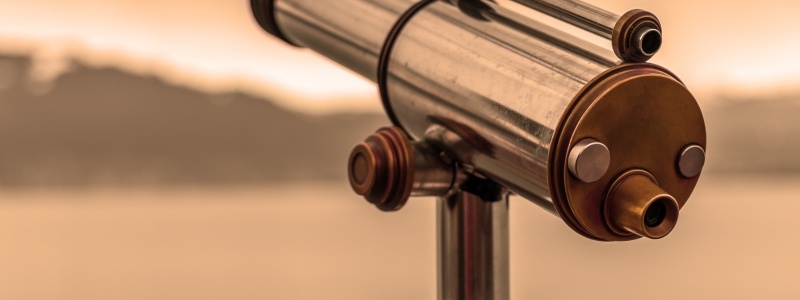
Checking The MOT And Service History
Summary: The MOT and service history show how well the car has been maintained and can reveal potential future issues.
MOT History
- Check the MOT history online: You can find a car's MOT history online.
- Check the expiry date: Make sure the MOT is valid.
- Note any advisories: These are things the tester suggested fixing.
- Investigate advisories: Some are easy to check, but others might be more serious.
Service History
- A service history is a bonus: It shows that the car has been well maintained.
- How important is it? It depends on the car's price, age, and type. A more expensive car might need a full service history.
Remember: If you find any issues with the MOT or service history, you can use them to negotiate a lower price.
Checking The Car's History
A car history check can reveal hidden problems.
- Stolen or written off: Many cars have a hidden history, including being stolen or written off.
- Outstanding finance: This can be expensive if you're not aware of it.
- Mileage discrepancies: The mileage might have been rolled back.
The RAC offers a data check that can give you peace of mind.
Car history checks can also provide information about:
- Common breakdown reasons for the car's make and model
- Common MOT failures for the car's make and model
- An independent car review
- Vehicle valuation
- Average running costs
Remember: Even a car history check won't reveal everything about a car. Ask the seller about the car's previous owners to learn more. For example, was it used as a pool car or a company car?
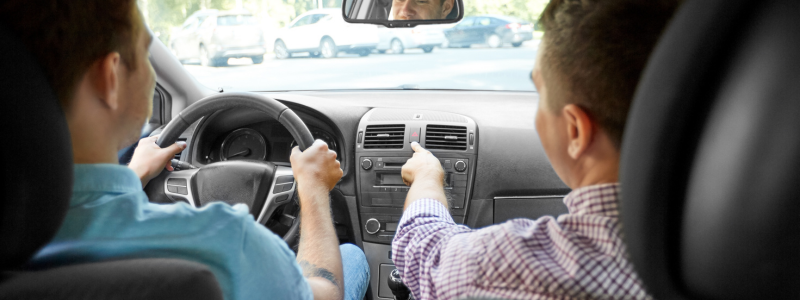
Used Car Test Drive
Summary: A proper test drive helps you assess the car’s performance, comfort, and mechanical condition before committing.
During the test drive, pay attention to the following:
- Starting the car: Does it start easily? A difficult start could indicate battery or alternator issues.
- Engine temperature: Check the temperature gauge. It should rise to halfway quickly and stay there. Overheating can be a sign of more serious problems.
- Clutch: The clutch should be easy to operate and engage smoothly. Avoid slipping the clutch, as this can damage it.
- Transmission: Gears should shift smoothly and without noise. Automatic cars should shift effortlessly.
- Steering: The steering should be smooth and responsive. Check for any unusual noises or pulling to one side.
- Suspension: Drive over bumpy roads to check for any unusual jolts or noises.
- Engine noise: Listen for any unusual noises while the engine is running. A rough or noisy engine might indicate maintenance issues.
- Performance: Test the car's acceleration, braking, and handling to ensure it meets your expectations.
- Comfort: Make sure the driving position is comfortable for you.
- Brakes: Test the brakes to ensure they stop the car smoothly and without pulling to one side. Check the handbrake as well.
Remember: The test drive is your chance to ensure the car is right for you. Don't be afraid to ask questions, and take your time.
Negotiating The Best Price On A Used Car
Summary: Effective negotiation is based on research, inspection findings, and being willing to walk away if the deal isn’t right.
Tips for getting a great deal:
- Be polite and fair: When negotiating, you’re more likely to get a better deal if you’re polite.
- Do your research: Know the car's value and compare prices from other sellers.
- Set a budget: Decide how much you will spend and stick to it.
- Highlight any issues: Point out any problems you found during the inspection.
- Offer a fair price: Be prepared to walk away if the dealer isn't willing to negotiate.
- Ask for extras: Instead of just asking for a lower price, ask for extras like a full tank of gas or a free service.
- Don't feel pressured: Take your time and don't rush into a decision.
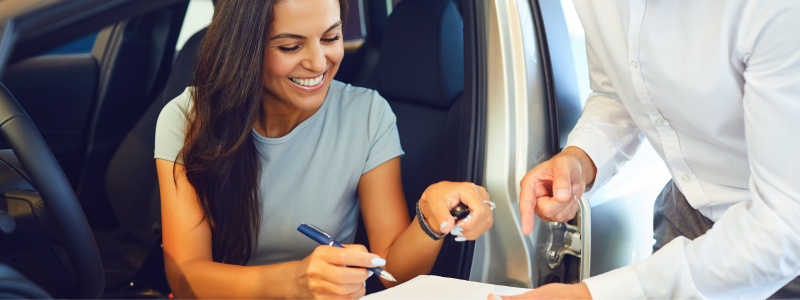
Paperwork To Sort At The Dealership
Summary: Before driving away, make sure insurance, road tax, ownership documents, and payment are handled correctly.
Before you drive away, make sure the paperwork, insurance, and payment are handled correctly to avoid legal or financial problems later.
- Insurance: You must be insured before driving the car away. Some dealers may offer short-term cover, but always check the cost and terms.
- Road tax (VED): Road tax does not transfer with the car. You must tax the vehicle before driving it, even if the previous owner had valid tax.
- V5C logbook: The dealer should update the V5C to show you as the new registered keeper. Make sure you receive a receipt or invoice as proof of purchase.
- Proof of ownership: Remember, the V5C is not proof of ownership. Always get a written invoice showing the seller’s details, the vehicle details, and the price paid.
- Payment method: Use a traceable payment method such as a bank transfer or credit card. Avoid cash payments, as they offer little protection if something goes wrong.
MOT Certificate:
- An MOT certificate is not a guarantee of roadworthiness on the day you buy the car.
- The MOT may have highlighted issues that the seller should have addressed.
- If you believe you bought an unroadworthy car, report it to Trading Standards and the DVSA.
V5C:
- The V5C is not proof of ownership.
- Ask the seller for proof of ownership, such as a receipt or invoice.
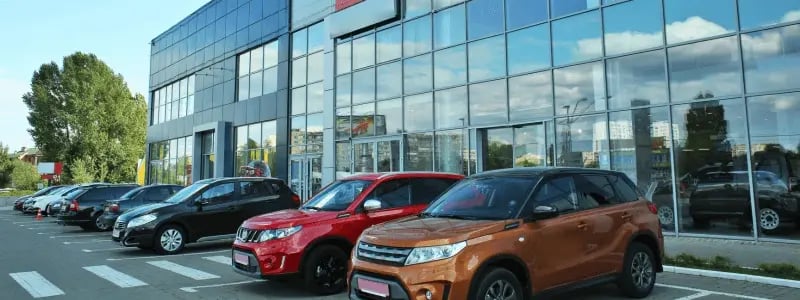
Dealer Warranties: What You Actually Get
Summary: Most dealerships include a warranty with a used car, but cover varies, so it’s important to understand exactly what’s included.
- Typical length: Many dealers offer a 3- to 6-month warranty as standard.
• What’s covered: Some warranties only cover major mechanical parts like the engine and gearbox. Others include electrics and labour, so always ask for a full breakdown.
• Exclusions: Wear-and-tear items (such as clutches, brakes, and tyres) are often excluded. Check the small print carefully.
• Manufacturer-approved warranties: Cars sold under manufacturer-approved or certified used schemes usually come with stronger warranties and more thorough inspections than third-party policies.
• Extended warranties: Dealers may offer extended cover at an extra cost. Compare this with independent warranty providers to see which offers better value.
Remember: A warranty is not a substitute for your legal rights. Even without a warranty, your protections under the Consumer Rights Act still apply.
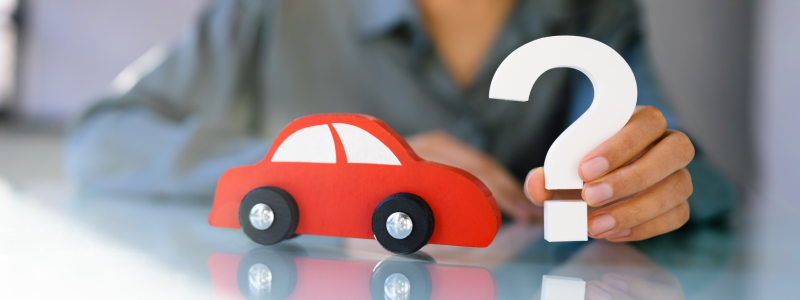
Frequently Asked Questions About Buying A Used Car
General Questions
When buying a used car, think about your budget, desired features, and the car's condition. Have a look at different models, read reviews and test drive a few cars to find the best fit.
Look for dealerships with positive reviews and a good reputation. Check what cars they have available online and read customer testimonials. You can also ask friends or family for recommendations. Need help finding a car? Check out Marsh Finance’s Car Marketplace.
When inspecting a used car, check the outside for damage, the inside for wear and tear, the engine for leaks, and the tyres for tread depth. Then, test drive the car to ensure it works properly and is comfortable.
Research the car's fair market value and be prepared to negotiate. If you're happy with the price, don't be afraid to walk away.
Check the car's V5C (logbook), MOT certificate, service history, and any other relevant documents.
If you believe your car is faulty, you need to get in touch with the seller immediately.
Thankfully, you are protected under the Consumer Rights Act. This ensures that all cars must be of satisfactory quality, fit for purpose and as described to you.
If you find a fault with your car, you might be entitled to:
- A repair
- Replacement
- Refund
Claiming quickly is important. This is how different response times affects your claim:
- Within 30 days: you can reject the car and get a refund.
- Between 31 and six months: you can get a repair or replacement. If you're still not happy, you can then reject the car and get a refund.
- After six months: you need to have proof that the fault existed when you bought the car. If you can prove this, you are entitled to a repair or replacement.
- After six year, you have no legal rights under the Consumer Rights Act.
Financing Questions
Marsh Finance offers car finance options for people across a range of credit scores. You can check your eligibility without impacting your credit score. Our application takes just 30 seconds, get started here.
We offer both Hire Purchase and Personal Contract Purchase car finance.
It depends. We do offer 0 deposit car finance. However, in general, a larger deposit can help you secure a lower interest rate. Want to find out how much you can borrow without impacting your credit score? Apply now.
Technical Questions
An MOT certificate is a yearly test to ensure that a vehicle is roadworthy. Cars over three years old require an MOT.
Additional Questions
Yes, it's really important to test drive a car before buying it. This allows you to assess its performance, comfort, and suitability for your needs.
- January 2026 (10)
- December 2025 (9)
- November 2025 (3)
- October 2025 (12)
- September 2025 (8)
- August 2025 (13)
- July 2025 (25)
- June 2025 (17)
- May 2025 (10)
- April 2025 (5)
- March 2025 (6)
- February 2025 (4)
- January 2025 (4)
- December 2024 (10)
- November 2024 (14)
- October 2024 (12)
- September 2024 (25)
- August 2024 (74)
- February 2024 (1)
- May 2023 (2)
- March 2023 (1)
- February 2023 (1)
- December 2022 (1)
- October 2022 (2)
- August 2022 (1)